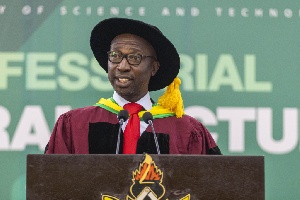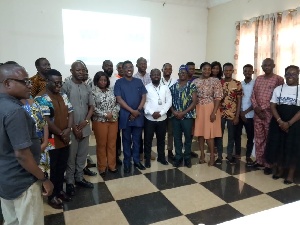Business News of Sunday, 20 April 2025
Source: www.ghanawebbers.com
KNUST scientist urges bold action on nanotechnology to power Ghana’s green energy
Professor Nathaniel Owusu Boadi from KNUST is urging the government, industry leaders, and scientists to embrace nanotechnology. He believes it can help solve Ghana’s energy challenges.
During his inaugural lecture, he presented a plan for using advanced research. His goal is to create affordable and sustainable energy solutions made in Africa.
The lecture was titled “Toward Accessible Green Energy for All: Harnessing the Power of the Invisible Giants.” It focused on nanomaterials, which are tiny materials engineered at the atomic scale. These materials could change how Ghana generates, stores, and uses energy.
Prof. Owusu Boadi highlighted that alternatives to traditional solar cells are possible. Advances in nanomaterials could significantly reduce solar energy costs. This would make it more accessible for underserved and off-grid communities.
He stressed the importance of producing these materials sustainably. Ghana's shift to green energy should not harm health or the environment.
Beyond solar power, Prof. Boadi discussed nanomaterials' potential in energy storage systems. They can enhance batteries, sensors, and smart displays.
His research team developed four new lead-based crystal structures. These have been accepted into the Cambridge Crystallographic Data Centre. This achievement showcases Ghanaian innovation on a global stage.
“These are not just lab experiments,” he stated. “They are building blocks for the future.” He emphasized that these innovations could power homes, clinics, and industries across Africa.
Prof. Owusu Boadi recommended that the Government of Ghana invest in nanotechnology research and development. He urged the Ministries of Finance and Energy to support this initiative to keep Ghana competitive globally.
He also called on regulatory bodies like FDA and EPA to establish safety standards for nanomaterials. These regulations should protect public health while fostering innovation.
His most ambitious idea is creating a National Nanotechnology Research Centre. This centre would be supported by the Ministry of Science and Technology along with academia and industry partners. It would accelerate developing homegrown solutions.
“We must stop being passive consumers of imported technologies,” he declared. With proper support, Ghana can become a hub for tailored nanotech innovation in Africa.











